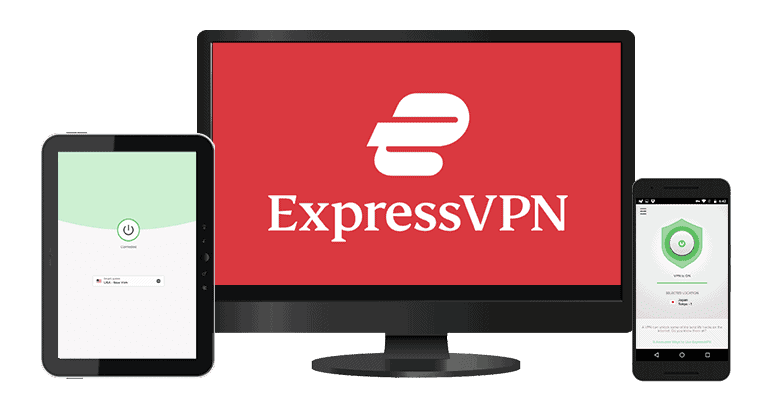
Updated on: November 12, 2024
Short on time? Here’s the best free VPN for Linux in 2025:
- 🥇 ExpressVPN : It’s not free, but ExpressVPN is the top VPN for Linux in 2025. It offers a 30-day money-back guarantee, so you can try it out risk-free and get a full refund if it doesn’t suit your needs — no questions asked. ExpressVPN has both GUI and CLI options for Linux, supports a wide variety of Linux distros, and offers the fastest speeds on the market.
Free VPNs are generally not the best choice, as they often come with restrictive data caps, have slow connection speeds, and lack essential security features.
And finding a good free VPN for Linux can be even more challenging due to the operating system’s relative lack of popularity — many VPNs don’t have Linux support, and of those that do, few offer a GUI (graphical user interface) for their Linux apps.
However, there are still some decent free VPN options available for Linux users. I tested the top VPNs on the market and compiled a list of the best free VPNs for Linux. These providers offer excellent speeds and great security and support a good number of distros.
My top pick is ExpressVPN. It may not have a free plan, but it’s without a doubt the best VPN for Linux in 2025. Plus, it has a 30-day money-back guarantee, so you can try it risk-free. Editors' Note: ExpressVPN and this site are in the same ownership group.
Quick Summary of the Best Free VPNs for Linux
🥇1. ExpressVPN — Best Overall VPN for Linux in 2025

ExpressVPN isn’t free, but it’s undoubtedly the best Linux VPN in 2025, and you can test it out risk-free by taking advantage of its 30-day money-back guarantee. ExpressVPN supports a wide range of popular Linux distros, including Ubuntu, Debian, Fedora, Arch, and Mint.
I think it’s great you can control the app with GUI and a CLI (command-line Interface). Although most Linux users are familiar with the terminal, having options is always a plus, and ExpressVPN is one of the few VPNs that have a GUI — which you can use via the Chrome and Firefox extensions.
And ExpressVPN’s privacy and security features are top-notch:
- No-logs policy. It doesn’t log your IP address, online activities, or downloads. Plus, the no-logs policy has been verified by multiple independent audits.
- Full leak protection. Keeps your data hidden by preventing IPv6, DNS, and WebRTC leaks.
- RAM-only servers. Your data is never stored on a hard drive and is erased every time the servers are turned off/reset.
- Perfect forward secrecy. Frequently changes the encryption key that protects your data. This way, if a single encryption key is compromised, your data from past and future sessions remains safe.
- ExpressVPN Keys. A pretty good password manager that is included in every ExpressVPN subscription for free. It securely stores passwords, auto-fills login details, and helps you generate strong passwords.
- Threat Manager. Protects against phishing sites and malicious websites and limits the amount of data third parties (like advertisers) can collect on you.
I like how easy it is to set up and use ExpressVPN on Linux devices. The installation process is simple, and there are detailed step-by-step guides (in both written and video format) on ExpressVPN’s website if you need any help — it only took me about 5 minutes to get it all working.
This provider is at the top of the list of the fastest VPNs, making it the ideal choice for browsing, gaming, streaming, and torrenting. In my tests, websites and videos loaded instantly, and I was able to stream HD content without any buffering.
It’s also excellent for streaming and torrenting — most free VPNs don’t support either one. ExpressVPN can access 100+ streaming services, including different Netflix, Amazon Prime, and Disney+ libraries, as well as Hulu and BBC iPlayer, and it allows torrenting on all of its servers across 105 countries.
ExpressVPN’s plans start at $4.99 / month, which is a little pricey, but it’s well worth the cost, as it offers the best value for Linux. Plus, I’ve seen ExpressVPN offer promotional deals that include a couple of extra free months.
Bottom Line:
ExpressVPN doesn’t offer a free plan, but it’s my top Linux VPN in 2025. Its app can be controlled using a GUI or CLI, it supports all major Linux distros, including Ubuntu, Debian, and Fedora, has lightning-fast speeds, and comes with strong security features. All purchases are backed by a 30-day money-back guarantee.
Read the full ExpressVPN review
🥈2. Proton VPN — Best Free VPN for Linux With Unlimited Data

Proton VPN is one of the only top VPNs whose free plan provides unlimited data, which makes it a great choice for browsing and one of the best free VPNs on the market. However, its free plan allows only 1 connection, access to servers in 5 countries (the US, the Netherlands, Romania, Poland, and Japan), and doesn’t support streaming or torrenting.
Like ExpressVPN, Proton VPN’s Linux app also has a GUI, but there’s a fully featured CLI app as well if that’s what you prefer. And it’s compatible with a large variety of Linux distros, including Ubuntu, Debian, Mint, and Fedora.
In terms of privacy and security, Proton VPN is very good. It uses perfect forward secrecy and has an independently audited no-logs policy. And although it doesn’t have RAM-only servers, it has full-disk encryption, which makes data on its servers unreadable. I also appreciate that all of Proton VPN’s apps are open-source, so anyone can inspect its code for vulnerabilities.
Proton performed great in my speed tests — websites loaded in 2–3 seconds, HD videos loaded within 3 seconds, and there was only minor buffering at the start of a video. I also really appreciate that the free plan automatically connects you to the fastest available server when you launch the VPN app, which is pretty convenient.
Proton VPN’s paid plans start as low as $3.59 / month and include streaming and torrenting support, servers in 112 countries, and an excellent ad blocker. The VPN backs all purchases with a prorated 30-day money-back guarantee.
Bottom Line:
Proton VPN is a great free Linux VPN for all online activities. It’s fast, secure, offers unlimited data, also has a GUI on its Linux app, and is compatible with popular Linux distros like Ubuntu, Debian, Mint, and Fedora. Its premium plans get you faster speeds and consistent streaming and torrenting support. All paid plans are backed by a prorated 30-day money-back guarantee.
Read the full Proton VPN review
🥉3. Windscribe — Great Free VPN for Streaming on Linux

Windscribe allows streaming on its free plan and works reliably with top streaming services, so it’s a good option if you need a Linux VPN for streaming content on Netflix, Disney+, and Amazon Prime. Plus, the free plan gives you access to servers in 10+ countries, including the US, the UK, the Netherlands, and Hong Kong — which is more than what you’ll get with most free plans.
However, its free plan provides only up to 15 GB of data per month (2 GB by default, 10 GB if you verify your email address, and 5 GB more by tweeting), which is enough for about 15 hours of streaming. That said, it’s the only free VPN on this list that allows unlimited simultaneous connections, so you can install it on all of your devices.
Windscribe has great Linux support. Its Linux app features a GUI, and it’s compatible with major Linux distros such as Ubuntu, Fedora, Debian, and Arch. That said, I still think ExpressVPN’s app is more user-friendly.
I was impressed with Windscribe’s speeds. In my tests on local servers, websites and videos loaded instantly, while on distant servers, they took only about 2–3 seconds.
And Windscribe has good security features. It uses perfect forward secrecy, has RAM-only servers, and includes a pretty good ad blocker called R.O.B.E.R.T (but it’s a limited version on the free plan).
Windscribe’s premium plans start at $5.75 / month. Upgrading gets you unlimited data, more servers, and extra features. However, Windscribe only offers a 3-day money-back guarantee.
Bottom Line:
Windscribe is a good free VPN for streaming on Linux — it consistently works with popular streaming services and has great speeds. Its free plan also provides access to 10+ server locations, allows unlimited simultaneous connections, and provides up to 15 GB of data per month. All of its plans are backed by a 3-day money-back guarantee.
Read the full Windscribe review
Bonus. hide.me — Fast VPN for Linux With Unlimited Data

hide.me offers unlimited data on its free plan and decent speeds on Linux. In my tests, sites loaded immediately, HD videos only took about 2–3 seconds to load, and there was minimal buffering.
Its free plan includes 8 server locations, too, including in the US, UK, Germany, and the Netherlands, so there are good chances that you can find a nearby server and get the best possible speeds for your location on your Linux.
The good news is the Linux app comes with strong security features, including RAM-only servers, perfect forward secrecy, and full leak protection.
hide.me’s affordable plans start at $2.39 / month and provide streaming support, servers in 58 countries, and more. All plans come with a 30-day money-back guarantee.
Bottom Line:
hide.me is a decent free VPN with good speeds on Linux. It provides unlimited bandwidth and access to 8 server locations. It also supports all Linux distros that allow manual VPN configuration and has advanced security features. Upgrading to a paid plan gets you unlimited data and access to more servers. hide.me backs all purchases with a 30-day money-back guarantee.
Quick Comparison Table
Editors' Note: ExpressVPN and this site are in the same ownership group.
How to Choose the Best Free VPN for Linux in 2025
- Look for a VPN with good Linux support. All the VPNs on this list have user-friendly GUI or CLI Linux apps and support many popular Linux distributions, such as Ubuntu, Fedora, Debian, Mint, and Arch.
- Choose a VPN with a high data usage limit. Free VPNs often put a cap on how much data you can use. I chose VPNs with generous data limits, allowing you to browse or stream without worrying too much about how much data you’re using. Proton VPN is the only free VPN on this list that offers unlimited data.
- Get a VPN with fast speeds. All VPNs will reduce your internet speeds due to the encryption process, and some free VPNs throttle your speeds. The VPNs on this list are all able to maintain very fast speeds — I had the fastest connections with ExpressVPN.
- Pick a VPN with a large server network. Many VPNs restrict the number of servers free users have access to. Alternatively, look for providers with servers in nearby countries as connecting to a nearby server will get you better speeds.
- Find a VPN with strong security. I recommend getting a VPN with industry-standard security features like 256-bit AES encryption, a strict no-logs policy, and a kill switch (drops your internet connection if you disconnect from the VPN).
- Pick a VPN that offers affordable premium plans. The VPNs listed here provide reasonably priced premium plans, should you decide to upgrade from their free versions. Moreover, they all offer a money-back guarantee, allowing you to try out their services risk-free before making a long-term commitment.
Risks & Disadvantages of Using a Free VPN
- No Linux support. Few free VPNs have good Linux support. Some don’t have a Linux app at all, and others might not be compatible with your Linux distro. Additionally, most free Linux VPNs don’t have a GUI, which makes them harder to use.
- Slow connection speeds. Free VPNs often impose speed limitations, which can lead to long web page and video load times and frequent buffering while streaming. Paid VPNs like ExpressVPN maintain ultra-fast speeds for all online activities, like streaming, torrenting, and gaming.
- Poor privacy and security. Many free VPNs lack essential privacy and security features, such as full leak protection, a no-logs policy, or a kill switch. This may expose your personal information to third parties like advertisers or your internet service provider (ISP). In fact, some providers monetize their free plans by selling this information, which leaves you vulnerable to cyberattacks.
- Restrictive data caps. Free VPNs typically impose daily or monthly data limits, and depending on your bandwidth cap, you may not be able to use the VPN for more than a few hours a day. Proton VPN offers unlimited data, so you can browse the internet as much as you want without worry.
- Limited server network. Free VPNs often have a smaller selection of server locations. This can cause overcrowding or force you to connect to a more distant server, resulting in slower speeds.
- Lack of streaming support. Most providers don’t support streaming on their free servers or have insufficient data allowances for streaming purposes. Paid VPNs work with streaming platforms more reliably and have no data restrictions. For example, ExpressVPN works with 100+ streaming services, including Netflix, Hulu, Amazon Prime, BBC iPlayer, and Disney+.
Free vs. Paid VPNs for Linux
Linux isn’t as popular as Windows or macOS for desktop computers, so many free VPN providers don’t bother to develop anything more than a bare-bones Linux app — if they even have one at all. The free VPNs I discuss here all offer industry-standard security on their Linux apps, including features like 256-bit AES encryption, a kill switch, and a strict no-logs policy. These features ensure that your data remains secure and your online activity isn’t compromised. Some free VPNs also offer stronger security features such as leak protection, RAM-only servers, or perfect forward secrecy.
That said, free VPNs often lack more advanced features that paid VPNs all typically offer. Most free VPNs have throttled internet speeds, as well as monthly or weekly data caps. This is really frustrating for all sorts of online activities, including streaming, gaming, and safely downloading. Also, some let you connect to only a few of their servers, which can lead to server congestion, resulting in even slower speeds and less reliable connections.
For example, hide.me doesn’t have a data cap on its free plan and lets you connect to 8 server locations, but it only has a CLI app, so setting it up can be a hassle. On the other hand, Windscribe has a GUI app and lets you connect to 10+ server locations on its free plan, but it has a data cap that can go up to 15 GB/month.
Getting a premium VPN service is generally better for Linux users. Paid VPNs are typically much faster, don’t have data caps, and let you use their entire server networks worldwide. Also, paid VPNs have better streaming and torrenting support. They also usually support multiple simultaneous connections on a single subscription and have better security. Moreover, most premium VPNs offer a money-back guarantee, allowing you to test their service risk-free to ensure it meets your needs before committing.
Free VPNs for Linux to Avoid
- Hola VPN. Hola VPN has a browser extension for Chromium browsers on Linux. However, it’s really dangerous, because it doesn’t have a typical server network — it assigns you an IP address from another user, and assigns your IP address to someone else. Someone could cause a lot of trouble for you by doing something illegal online while using your IP address.
- AceVPN. AceVPN lacks a lot of important security features, and the cumbersome manual setup process isn’t worth the effort (it doesn’t have dedicated apps for any operating system, Linux included).
- FinchVPN. FinchVPN’s website has a bare-bones home page, no information about the VPN service, and no way to contact anyone to inquire further.
- Tuxler VPN. Tuxler VPN functions much like Hola VPN, giving users each other’s IP addresses. Not only is it dangerous, but it also logs a lot of your data to sell to third parties.
- SuperVPN. SuperVPN records a lot of your personal information, like your IP address. It also suffered a data breach that exposed 133 GB worth of user data.
Top Brands That Didn’t Make the Cut
- NordVPN. NordVPN is one of the best VPNs on the market. It’s speedy, secure, and comes with some very unique features like malware protection and a dark web monitor. NordVPN supports Debian, Ubuntu, Elementary OS, Linux Mint Systems, and RPM-based distros, but it doesn’t have a GUI for Linux, and it doesn’t have a free plan.
- Hotspot Shield. Hotspot Shield’s free plan allows unlimited data, maintains good speeds, and has strong security, but its Linux app is only available to paid users.
- TunnelBear. TunnelBear is a cute and user-friendly VPN. Its free plan allows unlimited device connections, and it lets free users access all of its 45+ server locations. That said, it has very limited support for Linux devices, and its free plan has a pretty restrictive data limit of 2 GB per month.
Frequently Asked Questions
Are there any 100% free VPNs for Linux?
Yes, there are some pretty good free VPNs for Linux. My favorite is Proton VPN. It’s one of the few Linux VPNs with a GUI on top of a CLI app, and it supports a ton of Linux distros, including Ubuntu, Debian, Mint, and Fedora. It also has one of the best free plans on the market — it offers unlimited data, 5 server locations (in the US, the Netherlands, Romania, Poland, and Japan), fast speeds, and high-end privacy and security features.
Does Linux have a built-in VPN?
No, but it’s easy to get a third-party VPN instead. I recommend ExpressVPN because it’s the overall best VPN in 2025 and has excellent Linux support — it has both GUI and CLI apps and is compatible with most popular Linux distros, like Ubuntu, Debian, Fedora, and Arch. Additionally, it’s got the fastest speeds of any VPN on the market and strong privacy and security features.
Does Ubuntu have a free VPN?
No, Ubuntu doesn’t come with a free VPN. However, there are some free VPNs that support the Ubuntu Linux distro. Proton VPN is an especially good one — it has a GUI and a CLI app for Linux, is one of the only free VPNs with no data usage limits, provides 5 server locations (in the US, the Netherlands, Romania, Poland, and Japan), has very fast speeds for browsing, and comes with strong privacy and security features.
How do I install a VPN on Linux?
The easiest way to get a VPN on Linux is to install a VPN client. To do so, just follow these 3 simple steps:
- Step 1: Find a VPN that works on Linux. Make sure you check that it’s compatible with the specific Linux distro that you’re using. ExpressVPN is my favorite Linux VPN and supports the most popular distros like Ubuntu, Debian, Fedora, and Mint.
- Step 2: Get the VPN. Purchase a subscription to your chosen provider and download its Linux app.
- Step 3: Install the VPN on your Linux device. Follow the tutorial on the provider’s website to set up the VPN. The process may be different for different Linux distros.
